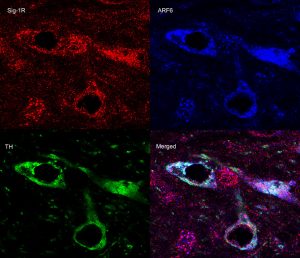 Featured Paper of the Month – Apil 2020.
Featured Paper of the Month – Apil 2020.
By studying brain tissue and neurons in vitro, Nakamura, Dryanovski et al. show that cocaine stimulates the release of endocannabinoids via extracellular vesicles. In essence, cocaine causes neurons to synthesize endocannabinoids that are then enclosed within membrane-bound packages. These packages – or extracellular vesicles – can then fuse with the cell’s membrane. Multiple protein interactions are necessary to permit this extracellular vesicle release, and the authors show that disrupting these control points prevents vesicle release. Functionally, this also disrupts the ability of cocaine to trigger endocannabinoid release and its effects on synaptic transmission in midbrain dopamine neurons. Cocaine thus drives endocannabinoid release in the brain’s pleasure centers via the assembly of extracellular vesicles and designing drugs to manipulate the protein interactions that underlie vesicle assembly could provide a new way to counter cocaine addiction.
Publication Information
Cocaine-induced endocannabinoid signaling mediated by sigma-1 receptors and extracellular vesicle secretion. Journal Article
In: Elife, vol. 8, 2019, ISSN: 2050-084X (Electronic); 2050-084X (Linking).
